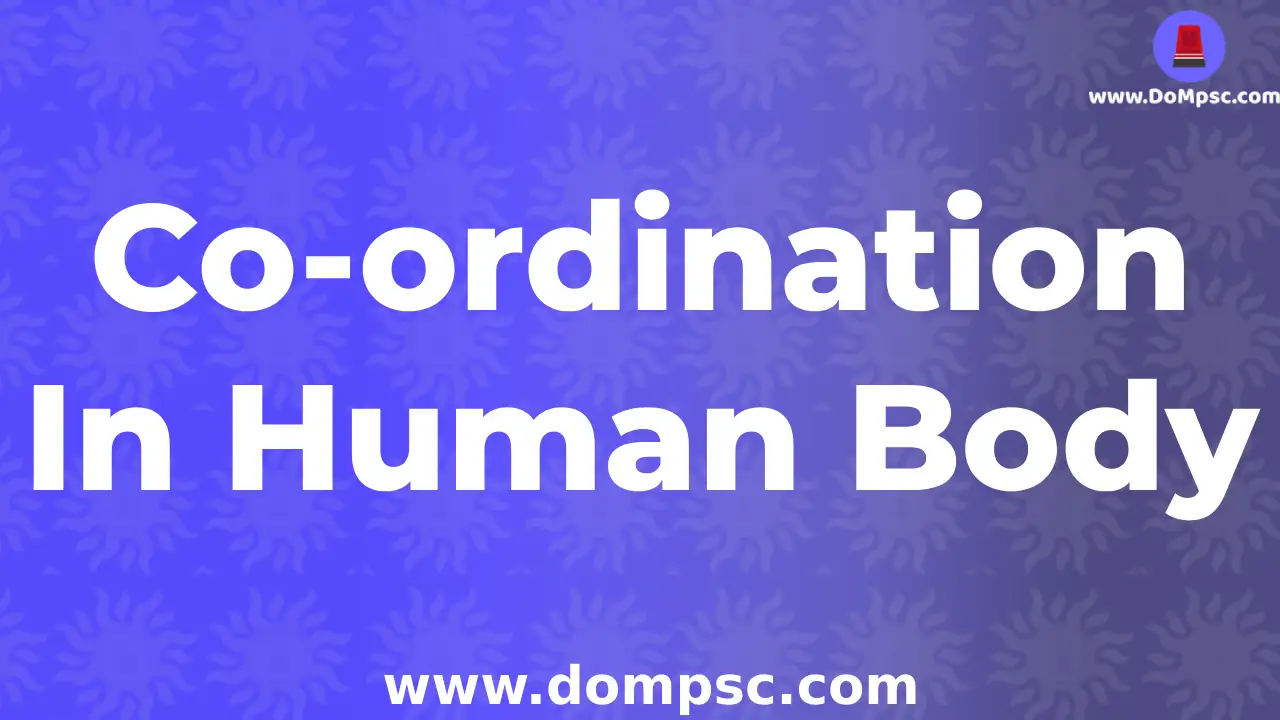MPSC Coordination in human(मानवातील समन्वय)-MPSC Biology science notes

✪ Download pdf Works Properly on chrome Browser ✪
Coordination in human(मानवातील समन्वय)
Table Of Contain-Mpsc Coordination in human(मानवातील समन्वय)
✪Intro of coordination of Body✪

By Shubham Vyawahare
0-May-2025
➤ coordination means performing each work with some back control systems.
➤ Like that in human brain is main part which perform all part and coordination in the human body.
➤ There are some work which done by brain and there are some work which controlled by brain in a background.
➤ Homeostasis is system in human body which maintain perfect coordination of all body work.
✪ Types OF Coordination ✪
✪ Nervous Coordination Systems ✪
➤ The Systems which deals with the work of body actions is known as Nervous Coordination systems.
➤ This includes a Brain , Spinal chord and Nerves.
1. Central Nervous Systems
➤ This systems controls the all work of body with the help of nerves and brain.
Brain
➤ brain is the main controlling part of a body
➤ There are several parts in the human brain and each part control specific action in the human body.
➤ There are left and right side of a brain.
➤ On that basis there are verities in thinking,so leftist and rightist in politics
➤ 3 Part of a brain is as follow.
1.Fore brain
➤ This is also known as a Cerebrum.
➤ This handle all voluntary actions of a brain
➤ like Listening,Eating,Speaking.
➤ the largest part of the brain.
➤ The structures in the forebrain include the cerebrum, thalamus, hypothalamus, pituitary gland, limbic system, and the olfactory bulb.
➤ This handle the the processing of information related to complex cognitive activities, sensory and associative functions, and voluntary motor activities.
2.Mid-brain
➤ This part of a brain handles a involuntary work of body.
➤ Involuntary work like a sleeping,work of heart.
➤ The mid brain is the topmost part of the brain stem, the connection central between the brain and the spinal cord
➤ helps a person to identify objects and understand spatial relationships
➤ The corpora quadriplegia are reflex centers involving vision and hearing.
2.Hind-Brain
➤ Ceebellum and Medulla Oblongesta are the main part of hind brain.
➤ This is also know as a small brain.
➤ Medulla Oblongesta maintain a all involuntary work in the body like secretions,blood circulation.
2.Peripheral Nervous Systems
➤ Nervous are the main performing part of the nervous systems.
➤Nervous are spread over in the all body.
➤The main work of the nervous is to joined all organs of body with central nervous systems.
1.Neurons
➤ In Neurons are the small working units work with network called Neuroglia.
➤ Neurons has it own executing units
➤ Dendrites:Propagate the electrochemical stimulation received from other neural cells to the cell body
➤ Cell Body:Electrochemical Impulses Created by the Dendrites are Transfer throw Cell body to the axon
➤ Axon:Impulses From Cell body is transfer toward a neurons network
Neuroglia
➤ This is a actual network in a human body.
➤ Main function of neuroglia is to transfer a messages from body to brain and brain to body.
➤ Afferent Nerve:Pulses transform from the sensitive part of a body to brain.
➤ EfferentPulses transform from the brain to sensitive part of a body.
Types of Neurons
➤ sensory Neurons:Which able to sense a environment and physical change and transfer pulses from sensory organs(like hand,skin ) to a brain.
➤ Motor Neurons:Transfer a pulses from a brain to Gland for internal work.
➤ Association Neurons: This Neurons perform a coordination work between other neurons.
3.AutomatedNervousSystems
➤ he autonomic nervous system is a component of the peripheral nervous system that regulates involuntary physiologic processes including heart rate, blood pressure, respiration, digestion, and sexual arousa.
✪Chemical Coordination In Body✪
➤ Enzymes and hormones are the main executing part of a chemical changes.
➤ They are create ,regenerates,manipulate,and perform a chemical reaction in the control of brain.
➤ Some Organs secretes a enzymes and hormones but only if any impulses ordered by a human brain.
➤ There are some parts of body which perform a chemical coordination.
➤ Various Gland are the main executing part of a organs.
Endocrine Gland
➤ Endocrinology is the branch which deals with the Endocrine Gland.
➤ Thomas adison is the father of this branch.
➤ This gland secretes its components directly into a blood.
➤ Therefore this glands doesn't require a duct to flow.It flow with blood.
➤ This Gland secretion is called as a Hormones.
➤There are some important Gland is as follows.
Pituitary Gland
➤Pituitary Gland is the main Gland in the brain which control a secretion of various Gland.
It has two types one is Anterior Pituitary Other is Posterior Pituitary
Types of Anterior Pituitary
Prolacting not controlled by this Gland .
➤ GH(Growth Hormone): Human growth controls your body's GH Hormone .
➤ TSH(Thyroid Stimulating Hormone):Regulate the production of hormones by the thyroid gland. .
➤ ACTH(Adreno Cortico Tropic Hormone):ACTH regulates cortisol and androgen production.
➤ Prolactin(leuteotropic Hormone)):Milk LActiting Hormone in Mother.
➤ GTH(Gonadotropic Hormone):They are not necessary for life, but are essential for reproduction.
➤ MTH(Melanotropic Hormone):Create melanin.
Types of Posterior Pituitary
➤ ADH(Anti-diuretic Hormones):Work in the DCT.
➤ Oxytocin:Milk ejecting Hormones.
➤ Coherin:Work in the Intestine.
Thyroid Gland
➤ This is the bigest Endocrine Gland.
➤ Present in the Larynx.
➤ Secretes Thyroxine.
➤ Work in the neck.
Adrenal Gland
➤ Adrenal glands are small glands located on top of each kidney.
➤ Regulate metabolism, immune system, blood pressure, response to stress and other essential functions.
Pineal Gland
➤ The pineal gland is a small, pea-shaped gland in the brain.
➤ Secretes melatonin.
➤ Melatonin regulates Sleeping Procedure.
Exocrine Gland (बाह्यस्त्रावी ग्रंथी )
➤ Does Not Directly secretes into a Blood
➤ This secretion is called as enzymes.
➤ Separate Duct are there present To flow a enzymes.
Types of Exocrine Gland
Prolacting not controlled by this Gland .
1.Liver
➤liver is a large, meaty organ that sits on the right side of the belly.
➤ The liver has two large sections, called the right and the left lobes
➤ The liver's main job is to filter the blood coming from the digestive tract, before passing it to the rest of the body.
➤ Weight:1.5Kg
➤ Hepatic Transfer a Pure Blood To Liver
2.Salivary Gland
➤ Produce a Saliva.
3.Pancreas
✪DiseasesRelatedCoordination ✪
➤ Alzheimer:Memory Loss For particular Time .
➤ Parkinson's Disease:Expression Less Situation.
➤ Huntingston's Chorea:Involuntary jerking or writhing movements .
Others Blogs Related to MPSC Biology Notes
➤Biology Exam Pattern
➤Blood Circulation System
➤Blood Groups And Its Diseases
➤Balanced Diet And Nutrients
➤Classification Of Animals
➤Classification OF Plants
➤Cell
➤Tissue
➤Coordination In Human
➤Digestive System
➤Diseases And Disease Types
➤Excretory System
➤Respiratory System
➤Reproductive System
➤Skeletal System
Read All MPSC blogs
- ➤केंद्र सरकारने खाजगी क्लासेस साठी नवी नियमावली लागू केली आहे |GUIDELINES FOR REGULATION OF COACHING CENTER in marathi
- ➤MPSC Data leak: पेपर न फुटल्याचा दावा MPSC आयोगाने स्पष्टपणे केला आहे
- ➤MPSC hall ticket data leaked before 6 days of exam
- ➤MPSC Data leak: टेलेग्राम वर अचानक ९० हजार परीक्षार्थींचे प्रवेशपत्र झाले लिक
- ➤मराठी भाषेला अभिजात दर्जा मिळायला हवाच , अभिजात दर्जा नेमका कसा मिळतो ?
MPSC Books pdf



